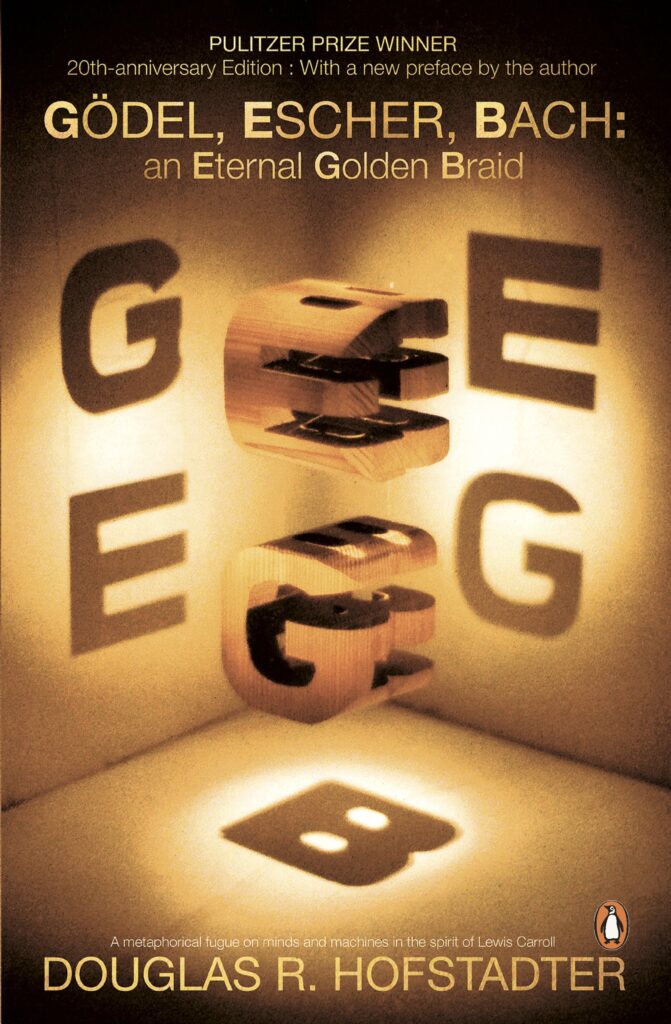Gödel, Escher, Bach: An Eternal Golden Braid is a Pulitzer Prize-winning book by Douglas Hofstadter that explores the relationship between mathematics, art, and music. The book is written in an unusual format that weaves together puzzles, dialogues, and metaphors, making it a challenging but rewarding read. In this blog post, we will explore the top 10 lessons from Gödel, Escher, Bach and their implications for our understanding of creativity, intelligence, and consciousness.
“Every aspect of mind is so intimately connected with every other aspect that no one aspect can be completely understood in isolation from the others.”
Lesson 1: The Importance of Self-Reference
One of the central ideas in Gödel, Escher, Bach is the importance of self-reference. The concept of self-reference is fundamental to understanding the paradoxes of logic and the limits of computation. Self-reference is also essential to understanding creativity, as it allows individuals to reflect on their own thoughts and ideas and build upon them in novel ways.
Lesson 2: The Limits of Formal Systems
Another key idea in Gödel, Escher, Bach is the idea that no formal system can fully capture the complexity and richness of human thought and creativity. Gödel’s incompleteness theorems demonstrate that any formal system that is powerful enough to capture the complexity of arithmetic will inevitably contain statements that cannot be proven true or false within the system. This suggests that there are limits to what we can know and understand using formal systems alone.
Lesson 3: The Emergence of Meaning
Hofstadter argues that meaning is an emergent property of complex systems, including human minds. Meaning arises from the interaction of simple elements that give rise to complex patterns and structures. This suggests that intelligence and creativity are not simply the result of individual neurons or algorithms, but rather emerge from the interactions of many simple elements.
Lesson 4: The Power of Analogy
Hofstadter emphasizes the importance of analogy in creative thinking. Analogies allow us to see connections and patterns that might otherwise go unnoticed, and they provide a framework for exploring new ideas and concepts. Analogies are also central to the way that we understand and communicate complex ideas, as they allow us to relate new concepts to things we already understand.
Lesson 5: The Role of Repetition
Repetition is a powerful tool for learning and creativity. Repetition allows us to notice patterns and connections that might otherwise go unnoticed, and it provides a framework for exploring new ideas and concepts. Repetition is also essential to the way that we learn and remember information, as it allows us to consolidate new information into long-term memory.
Lesson 6: The Importance of Context
Context plays a crucial role in shaping our understanding and interpretation of information. Different contexts can lead to different interpretations of the same information, and our understanding of information is constantly evolving based on new contexts and experiences. This suggests that intelligence and creativity are not simply a matter of processing information, but are also shaped by our experiences and the context in which we encounter information.
Lesson 7: The Limits of Reductionism
Hofstadter argues that reductionism, the idea that complex systems can be fully understood by breaking them down into their constituent parts, has its limits. While reductionism can be a useful tool for understanding some aspects of complex systems, it cannot fully capture the emergent properties and interactions of those systems. This suggests that a more holistic approach to understanding intelligence and creativity is needed.
Lesson 8: The Importance of Play
Play is an essential component of creativity and learning. Play allows individuals to explore and experiment with ideas in a low-pressure environment, and it encourages the development of new and innovative ideas. Play also provides a framework for social interaction and the development of social skills.
Lesson 9: The Role of Emotion
Emotion plays a crucial role in shaping our thoughts and behaviors. Emotions can influence our perception of information, our decision-making processes, and our ability to learn and create. Emotions can also inspire and motivate us to pursue our goals and to seek out new experiences and challenges.
Lesson 10: The Illusion of Self
Hofstadter suggests that the self, or the sense of individual identity, is an illusion created by the interactions of different parts of the brain. The self is not a fixed entity, but rather an ever-changing process that emerges from the interactions of different cognitive processes. This suggests that the boundaries between individuals are more fluid than we might think, and that our sense of individual identity is constantly evolving based on our experiences and interactions with others.
Conclusion
Gödel, Escher, Bach: An Eternal Golden Braid is a complex and challenging book that explores the relationships between mathematics, art, and music. Through puzzles, dialogues, and metaphors, Hofstadter offers insights into the nature of creativity, intelligence, and consciousness. The top 10 lessons we have explored in this blog post highlight the importance of self-reference, the limits of formal systems, the emergence of meaning, the power of analogy, the role of repetition, the importance of context, the limits of reductionism, the importance of play, the role of emotion, and the illusion of self. By reflecting on these lessons, we can gain a deeper understanding of ourselves and the world around us, and we can appreciate the complex and interconnected nature of human thought and creativity.

Gödel, Escher, Bach: An Eternal Golden Braid
Douglas R Hofstadter



